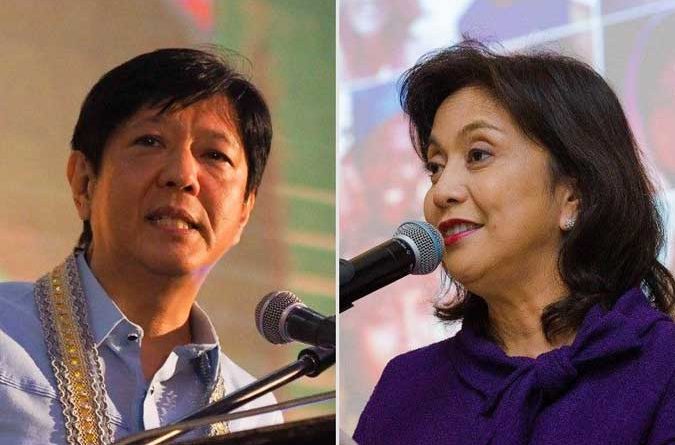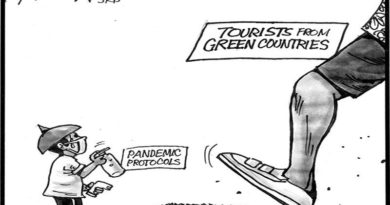OPINION-COLUMNS: Eagle eyes- Marcos v. Robredo: Lessons for future elections
“It is almost taken for granted here that the losing candidate will always cry foul.”
.
.
Sometimes, elections do not end when the polls close. But it should have in the case of Marcos v. Robredo where the Supreme Court, speaking through Justice Marvic Leonen, applied two well-settled principles that are at the center of election law and the right to suffrage: (1) Citizens should not be deprived of their right to vote; (2) The will of the voter must always be upheld.Marcos v. Robredo, between the protestant candidate Bongbong Marcos and protestee, proclaimed and sitting Vice President Leni Robredo, is a historic decision in that it is the first protest before the Presidential Electoral Tribunal (PET) that reached a full conclusion.
.

Prior protests ended as moot and academic when the protesting party abandoned his case one way or another, usually by election to another office before the PET resolved his case. As with other Supreme Court cases, Marcos v. Robredo, drawn from and comments on prior election cases, and thus contributes to the further development of electoral case law.
.

But being the first of its class, Marcos v. Robredo will undoubtedly influence future presidential and vice-presidential protests. And with the 2022 elections right on the horizon, in the middle of a pandemic, these rulings cannot be any more timely.In any but the most undeniable of electoral results, it is almost taken for granted here that the losing candidate will cry foul. And given the experience of the US elections in November 2020, and the following violence, the handling of such protests may be life and death for Philippine democracy.
.

In this series, which I co-wrote with colleague Christian Luna, we unpack Marcos v. Robredo, its main decision and the “concurring in the result” separate opinions of the Supreme Court (sitting as the Presidential Electoral Tribunal).This is the first lesson of the Decision, penned by Justice Marivic Leonen. Specificity is one of the first lessons in the crafting of a pleading or petition (“Every pleading shall contain in a methodical and logical form, a plain, concise and direct statement of the ultimate facts”; Rule 8 Sec. 1 Rules of Court). When the heart of a democracy and one of the most sacred rights of a democratic citizen is at stake, however, Marcos v. Robredo makes that lesson first and foremost, citing Peña v. House of Representatives Electoral Tribunal: “The power to annul an election should be exercised with the greatest care as it involves the free and fair expression of the popular will.”
It is telling that the ponencia would highlight that Marcos’ case could have been dismissed under Rule 21 for insufficiency of form or substance, but instead the Tribunal chose to “painstakingly [hear] every argument to afford the parties due process.” And still, it would describe Marcos’ allegations as “[appearing] bare, laden with generic and repetitious allegations, and lacking critical information as to the time, place, and manner of the alleged irregularities.”
We lawyers do admit to working with “boilerplate text”: standard formulae, words, phrases, and clauses that go into our pleadings and petitions, our motions and memoranda. Though “boilerplates” speak of minimal effort in their employment, they are not used necessarily out of laziness. They have become standard expectations in legal language and argument, helping to streamline our thought processes, to free up more legal labor to the more essential tasks: Case theory formulation, narrative crystallization, evidentiary and jurisprudential justification.While we do not intend to disparage the protestant’s counsels in this piece, we must observe that the ponencia was, dare we say, savage in exposing some of the protest’s core arguments as boilerplates. Granted, especially when using Mindanao-based electoral precincts as the loci for electoral protests, the phrase “massive electoral fraud, anomalies, and irregularities, such as but not limited to terrorism, violence, fraud… vote-buying… etc.” is a common, even expected allegation. As the ponencia observed, the protestant’s manner of allegation is “glaringly” similar to that in the prior cases of Peña and Aguillo.
.

And similarly found wanting: Absent specific allegations narrowed down to place, time, assailed action, and/or personalities, with necessary corroboration, “[they] failed to impress the Court. There is no reason to treat this Protest differently.”This isn’t to state that all the Marcos camp submitted were boilerplates and bare allegations—no lawyer would survive a case if these were all he had. But that evidence presented becomes even more telling of the Decision’s criticisms of boilerplate: not just the absence of stringently specific allegations, but in a few cases actual blanks. As in underlined spaces where it is expected that the pertinent data would be filled in.Maybe it was simply the sheer scale of the case work involved, but in the protestant’s case, a number of blanks were left in their submissions: the date and place of the examination of a witness in one Judicial Affidavit. The identity of the electoral precinct of another witness claiming disenfranchisement. Even the main Protest itself (the Petition) had a few such blanks “signifying the absence of important details.”Website: tonylavina.com Facebook: deantonylavs Twitter: tonylavs
.











